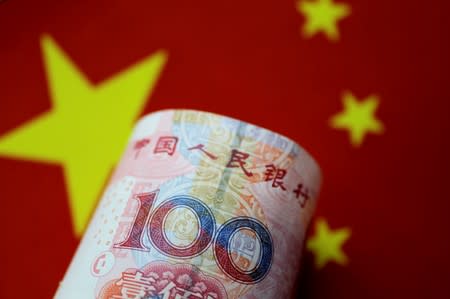By Tommy Wilkes
LONDON (Reuters) - China's yuan fell to an 11-year low in the onshore market and a record low offshore on Monday after the latest escalation in the U.S.-China trade war rattled investor confidence.
President Donald Trump announced an additional 5% duty on $550 billion in targeted Chinese goods on Friday, hours after Beijing unveiled retaliatory tariffs on $75 billion worth of U.S. products, sending stocks into a tailspin and investors rushing for the safety of bond markets.
At the G7 meeting in France over the weekend, Trump caused some confusion by indicating he may have had second thoughts on the tariffs.
On Monday he said China had contacted U.S. trade officials to say they wanted to return to the negotiating table - those comments helped the yuan off its lows.
In China's onshore market, the yuan fell to 7.1500 per dollar, the lowest since February 2008.
In the offshore market, the yuan slid to as low as 7.187 yuan, the weakest since international trading in the currency began in 2010, before recovering to 7.1624 yuan - down 0.4% on the day - after Trump's upbeat comments on a trade deal.
In a sign that some calm had returned to markets, the Japanese yen - which investors regard as a safe-haven - fell 0.4% to 105.76, having earlier hit a new seven-month high of 104.46 earlier on Monday.
Commerzbank analysts said "market sentiment has been undoubtedly hit hard as there is an even lower chance of a trade truce in the foreseeable future."
They said China could let the yuan "depreciate further to ease the tariff pains, and somehow weaponize the currency to anger Trump." Although they added that China would be reluctant to allow any uncontrollable currency depreciation given it would spur capital outflows and a massive hit to investors confidence.
Elsewhere, the dollar rebounded and was last up 0.3% against a basket of currencies.
Versus the euro it rose 0.2% to $1.1115.
Writing before Trump's comments helped the dollar to rebound, Marshall Gittler, a strategist at ACLS Global, noted that the greenback was not behaving as a safe-haven currency.
"Today's move suggests that the market is beginning to wonder if Trump isn't shooting himself and the U.S. economy in the foot with his endless trade war," he wrote.
The Turkish lira weakened around 1% to more than 5.8 against the dollar on Monday after briefly plunging to 6.47 in what market watchers described as a "flash crash" as Japanese investors cut risk assets.
The Australian dollar, a liquid proxy for global risk sentiment, earlier fell to $0.6690, within a whisker of a recent decade-low of $0.66775, before recovering to $0.6750.


